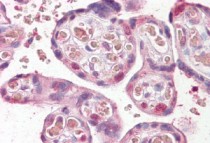ARG65309
anti-FANCE antibody
anti-FANCE antibody for IHC-Formalin-fixed paraffin-embedded sections and Human
Gene Regulation antibody
Overview
| Product Description | Goat Polyclonal antibody recognizes FANCE |
|---|---|
| Tested Reactivity | Hu |
| Predict Reactivity | Cow |
| Tested Application | IHC-P |
| Host | Goat |
| Clonality | Polyclonal |
| Isotype | IgG |
| Target Name | FANCE |
| Antigen Species | Human |
| Immunogen | C-EHKSLESLADGGS |
| Conjugation | Un-conjugated |
| Alternate Names | Protein FACE; FACE; Fanconi anemia group E protein; FAE |
Application Instructions
| Application Suggestion |
|
||||
|---|---|---|---|---|---|
| Application Note | IHC-P: Antigen Retrieval: Steam tissue section in Citrate buffer (pH 6.0). * The dilutions indicate recommended starting dilutions and the optimal dilutions or concentrations should be determined by the scientist. |
Properties
| Form | Liquid |
|---|---|
| Purification | Purified from goat serum by antigen affinity chromatography. |
| Buffer | Tris saline (pH 7.3), 0.02% Sodium azide and 0.5% BSA. |
| Preservative | 0.02% Sodium azide |
| Stabilizer | 0.5% BSA |
| Concentration | 0.5 mg/ml |
| Storage Instruction | For continuous use, store undiluted antibody at 2-8°C for up to a week. For long-term storage, aliquot and store at -20°C or below. Storage in frost free freezers is not recommended. Avoid repeated freeze/thaw cycles. Suggest spin the vial prior to opening. The antibody solution should be gently mixed before use. |
| Note | For laboratory research only, not for drug, diagnostic or other use. |
Bioinformation
| Database Links | |
|---|---|
| Background | The Fanconi anemia complementation group (FANC) currently includes FANCA, FANCB, FANCC, FANCD1 (also called BRCA2), FANCD2, FANCE, FANCF, FANCG, FANCI, FANCJ (also called BRIP1), FANCL, FANCM and FANCN (also called PALB2). The previously defined group FANCH is the same as FANCA. Fanconi anemia is a genetically heterogeneous recessive disorder characterized by cytogenetic instability, hypersensitivity to DNA crosslinking agents, increased chromosomal breakage, and defective DNA repair. The members of the Fanconi anemia complementation group do not share sequence similarity; they are related by their assembly into a common nuclear protein complex. This gene encodes the protein for complementation group E. [provided by RefSeq, Jul 2008] |
| Research Area | Gene Regulation antibody |
| Calculated MW | 59 kDa |
| PTM | Phosphorylated. Phosphorylation by CHEK1 at Thr-346 and Ser-374 regulates its function in DNA cross-links repair. Ubiquitinated. Phosphorylation by CHEK1 induces polyubiquitination and degradation. |
Images (1) Click the Picture to Zoom In






